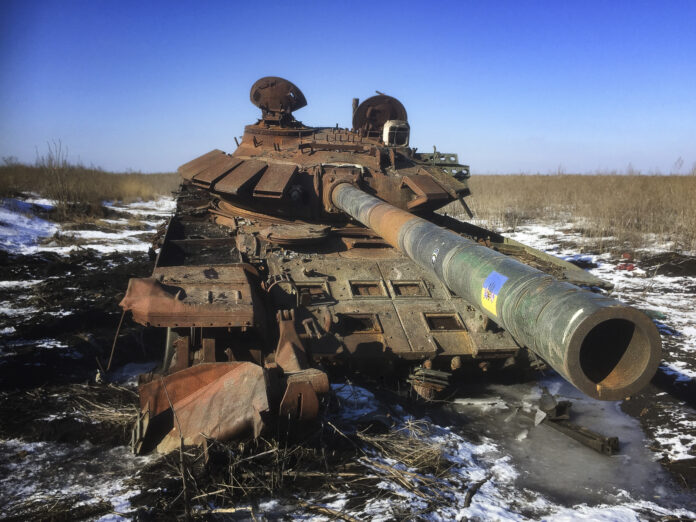On the Ground in Ukraine: Part 2
Six miles from the Russian border, we bring food and free Bibles to people in the Ukrainian village of Lyman, which sometimes sits between the shooting. As our small team unloads boxes and chats with villagers, artillery booms nearby, tanks lurk in forests, and hundreds of soldiers traverse muddy roads on their way to and from the front lines. The sound of shelling no longer fazes people, and neither do the sub-freezing temperatures.
A mother and her adult daughter grab me before leaving, eyes gleaming as they talk about how they discovered church, which they call “the house of prayer.”
“Now all my family is going to church,” says the mother, holding her Bible proudly. “I couldn’t live without church!”
“Before the war, we invited people to church all the time, and no one came. Then, in one moment … they just started to come, and more and more people are coming.”
The pair survived in a basement without water or electricity when war swept over. But they have found new, spiritual life, even while surrounded by armies. Against the odds, hope is flourishing in many places across this war-weary country.
Battle zones have a distinct look. Tanks sit abandoned in rolling fields. Civilian life has vanished or been pushed to the margins. Roads are muddy and wide. Electric lines hang useless, severed by one army or the other. Blown-up bridges force us onto adjacent, floating pontoon bridges to cross wide, icy rivers. Soldiers speed to and from the front lines in tanks, vans and troop transports. Sections of highway are neatly pockmarked by strafing from fighter jets.
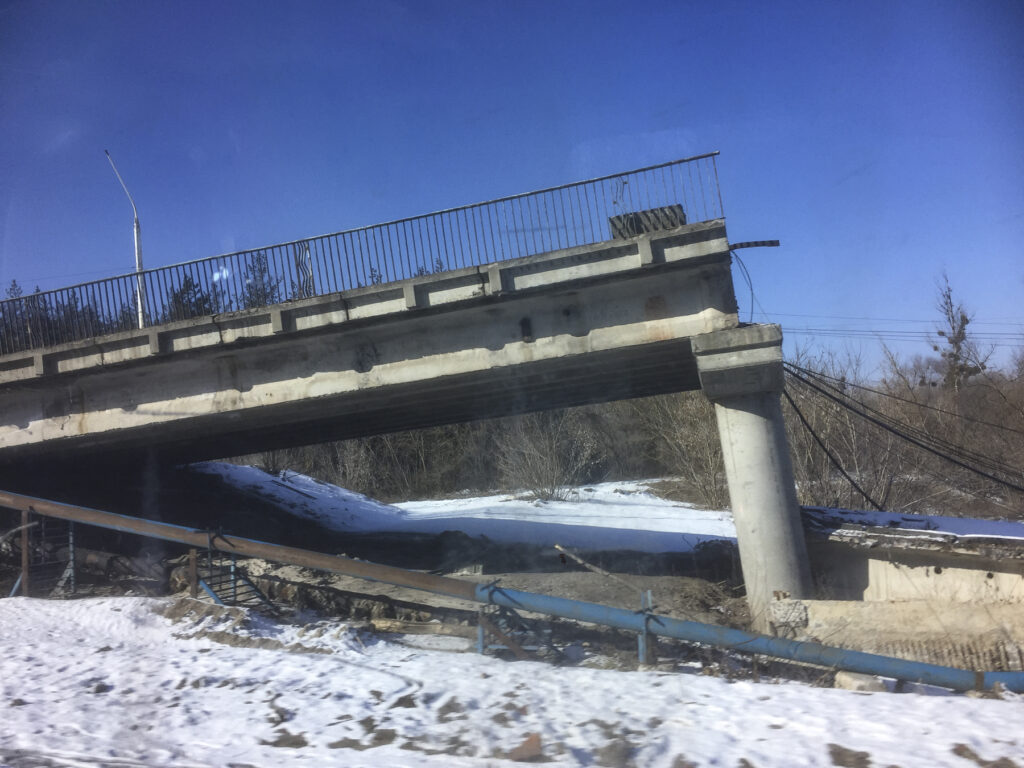
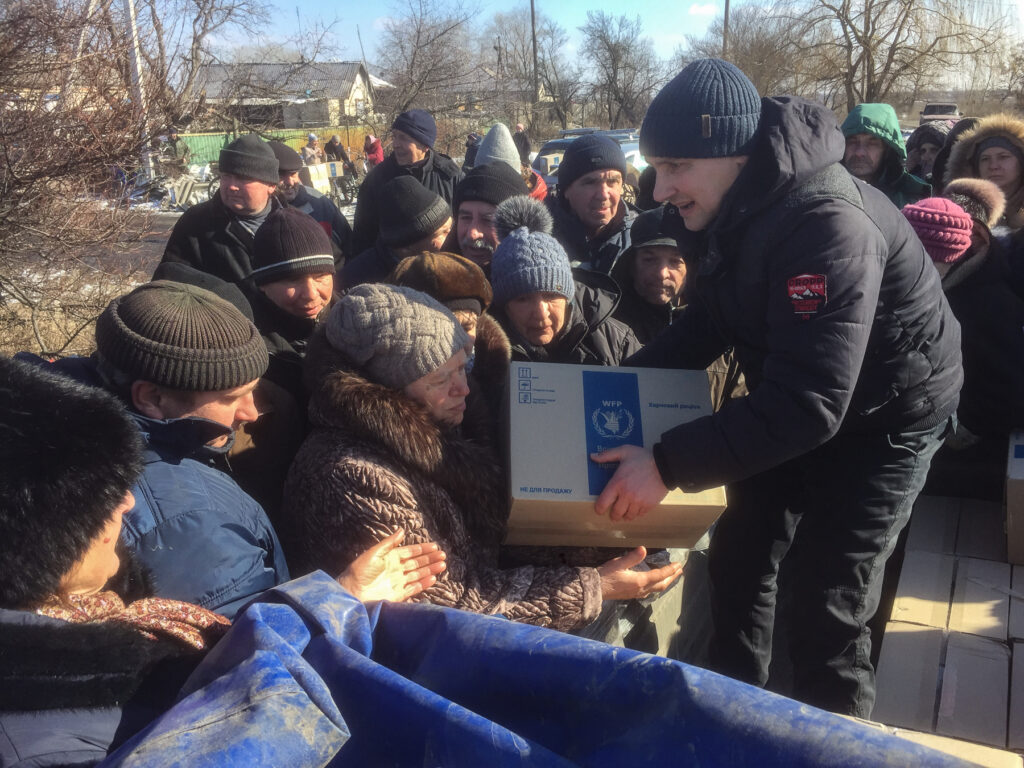
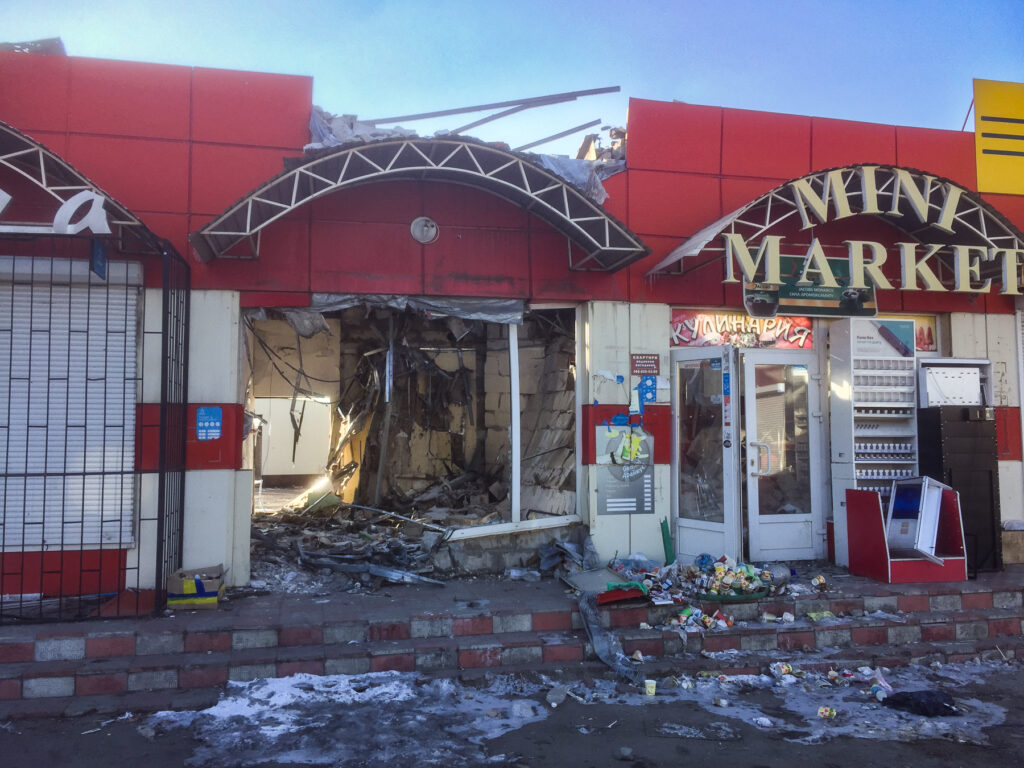
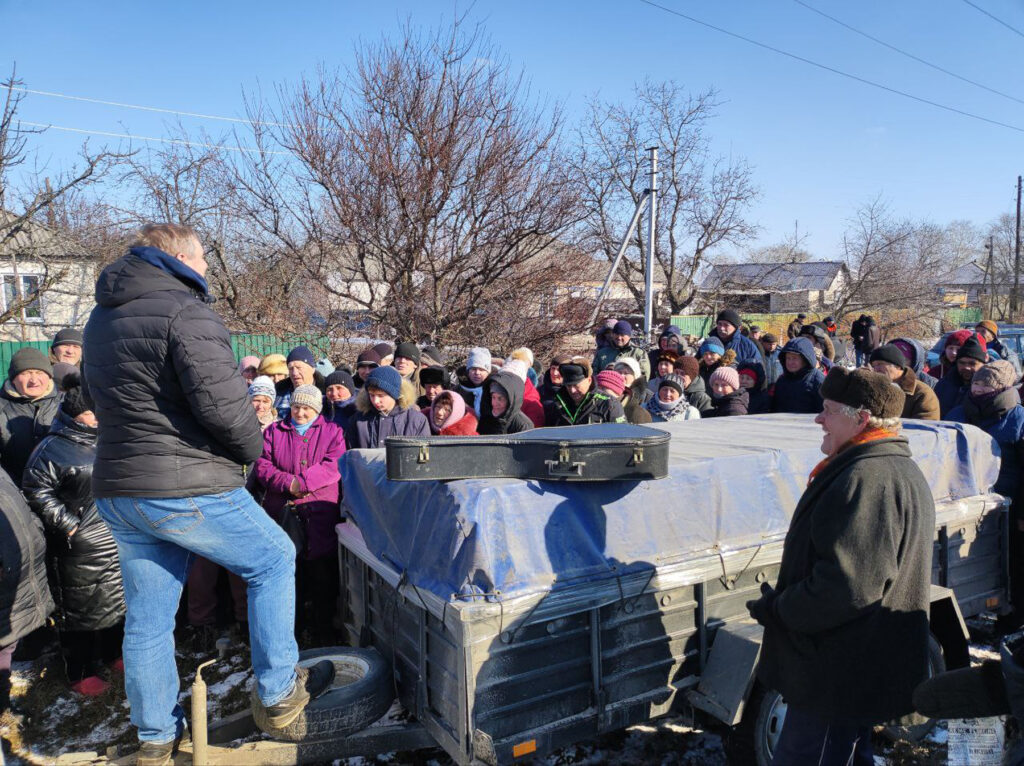
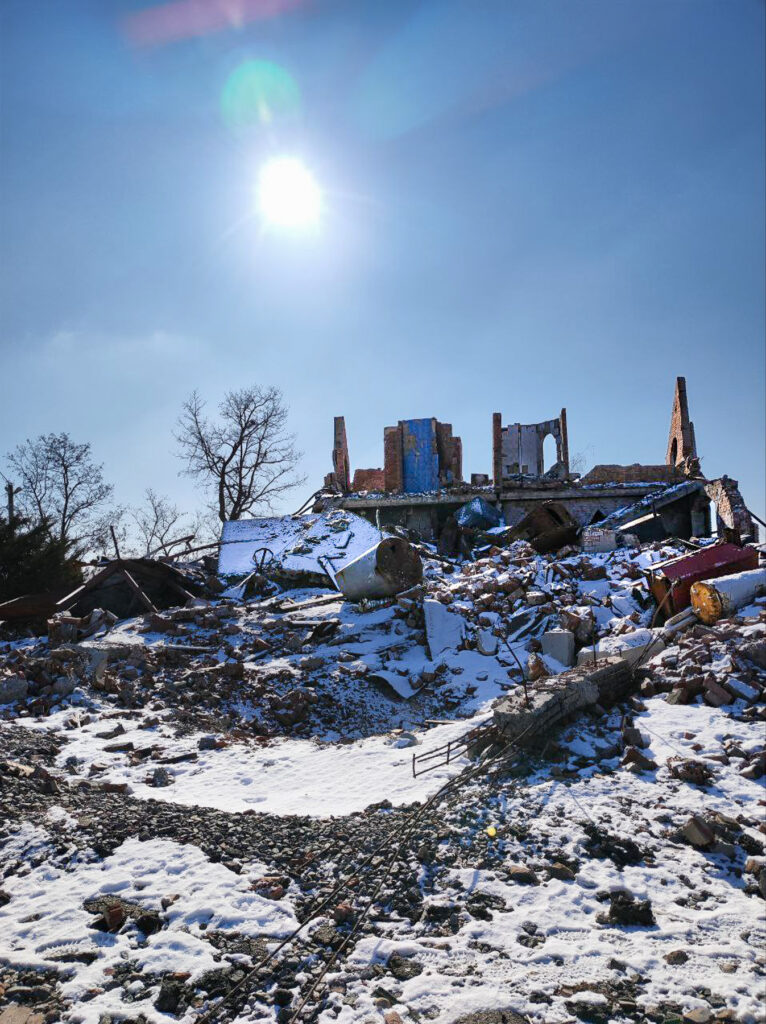
At one point, explosions on a hillside stop traffic — soldiers are detonating land mines. Blackened, empty villages line the road. Just ahead, the larger city of Izium seems torn from a post-apocalyptic graphic novel — bombed and blasted to pieces, multistory buildings cloven in two by missiles and mere handfuls of people moving about in vacant streets.
Here we meet Vitaly and Tatiana, a Christian couple who just started a center for foster kids and young people to share meals, play ping pong and receive tutoring. When rockets were flying, the couple brought busloads of elderly and disabled people out of conflict zones — 138 in total, Vitaly says, showing me videos of them hoisting wheelchair-bound people into Sprinters.
Today, their concern is children.
“There are 2,000 kids who can’t study because they don’t have access to a school,” Vitally tells us over tea and cookies in a house once commandeered by Russian soldiers for living quarters. “The kids went through wartime and some really hard things, so we are trying to rehabilitate them. … Some tell stories of the occupation and start crying. Some still live in basements because their houses were partially destroyed, and they fear returning.”
“We have never seen a time like this when the Ukrainian people hear the gospel like they do now.”
Today, the greatest need in Izium is hope — and an internet connection so children can at least try to do schoolwork.
“Our city is destroyed, and because there is no good internet connection, kids can’t go to school,” says Tatiana. “So we have internet here [at the center], so kids have a good connection for their lessons.”
After a long day passing through multiple checkpoints, where heavily-armed soldiers demand passports, our van pulls back into Kharkiv, a cold-weather industrial metropolis just 20 miles from the Russian border. Missiles hit it on the day of our arrival. But war is not the biggest problem here, a 24-year-old Christian man tells us. Rather, it’s social isolation. After two years of COVID shutdowns and then war, local kids don’t know how to interact properly anymore, he says.
“They just wander the streets or play phone games at home,” the man laments.
Further to the west, in comparatively wealthy Warsaw, Poland, some young people have been galvanized into a kind of roving revival. Here, I meet and travel with dozens of young Ukrainian Christians who have formed teams to evangelize people in city squares and subway passages. Their joyful guitar-playing and singing catch attention, and they invite young people to Bible studies and church meetings.
At one such meeting on a cold Thursday night, 45 young people gather in a warm upper room to pray, worship, laugh together and discuss the Bible. All fled from Ukraine due to the war. The meeting is led by Alexander, pastor of the Word of Faith network of churches, who prefers to give me only his first name.
“We have never seen a time like this when the Ukrainian people hear the gospel like they do now,” he says. “When we heard about revival many years ago, we were thinking it was going to be something very nice in a peaceful time, and everybody would repent. We never thought it was going to be war. We never thought that people would hear about Jesus in this way.”
But because of the war, people now tell him, “We never wanted to hear the gospel before, but now we are listening.”
“Right now is revival time in Ukraine,” says Alexander. “We need workers and good ministers and people who will serve because very soon, we feel that this time will be over. We want to do as much as we can right now, and we believe God will help us.”
Alexander’s right-hand man, Vaium (pronounced VAH-dim), 32, recounts how churches were perfectly poised to help refugees when war began.
“You can’t imagine what it was like,” he says of the time when the church housed hundreds. “A lot of kids, a lot of crying, everyone needs to go to the washroom.”
Then truckloads of supplies began arriving out of nowhere. That led the church network to find a big warehouse to receive trucks loaded with provisions from Spain, Italy, Germany, and even far-off countries like Australia, the Philippines and Thailand. In turn, the church sent five or six trucks per day full of food, diapers and other personal necessities into Ukraine and to refugee centers in Poland — almost 3,000 tons of supplies, at the hands of 400 volunteers.
A day’s travel away, in the Ukrainian heartland city of Kremenchuk, one pastor, Vladimir Avilov, has seen his church more than quadruple in size in just a few months. He has had to rent the large hall downtown to accommodate those showing up on Sunday mornings for teaching, music and fellowship.
“Before the war, we invited people to church all the time, and no one came,” Avilov says. “We began to ask, are we sure we are doing everything right? Where are the people? Then, in one moment, people came. We were just continuing to do what we did before. Nothing changed. They just started to come, and more and more people are coming.”
Avilov not only feeds them spiritually but holds meetings in various parts of the city and surrounding villages to give away countless tons of humanitarian aid. But even when they no longer receive food, people continue to come for fellowship and a sense of meaning.
On a Friday night in the strategically darkened city, Avilov’s family holds a Friday night worship service at a different rented space. Electricity has been promised for one hour, after which the assembled group will have tea together until the landlord turns the lights out. The city is routinely hit by missiles or menaced by drones — which are sometimes blown out of the sky with a deafening blast in the middle of the night.
But tonight, all is well. Yana, 33, a wife and mother, is eager to speak of the joy she has found among these believers.
“God sent me a message: ‘Come here, come here.’ I felt it in my heart and said, ‘Why not? Okay, I’m coming,’ And I like it,” she says in English. “You see the situation here is awful, but we believe in God. Every day we are praying, ‘God, help us. Protect our army, our people,’ and we are waiting for it to end soon.”
Lidia, a retired woman from Kharchiv, woke up in February 2022 to the sound of shooting and explosions around her. She and a few relatives and friends quickly piled into her Mazda 3 with their small bags and fled.
“We checked the news from our car and saw pictures from around my house, where a rocket had hit, and people died,” she tells me. “We saw blood everywhere. We couldn’t believe it was going on.”
Why does she come to church? I ask her.
“I really like the spirit of unity here. A very calm spirit,” she says. “I didn’t go to church in Kharchiv. I feel peace in my heart here.”
Like other pastors, Avilov believes the current revival may last only a short time. But while the world hopes for the war to end, a kind of awakening continues in Ukraine and among its displaced people.

